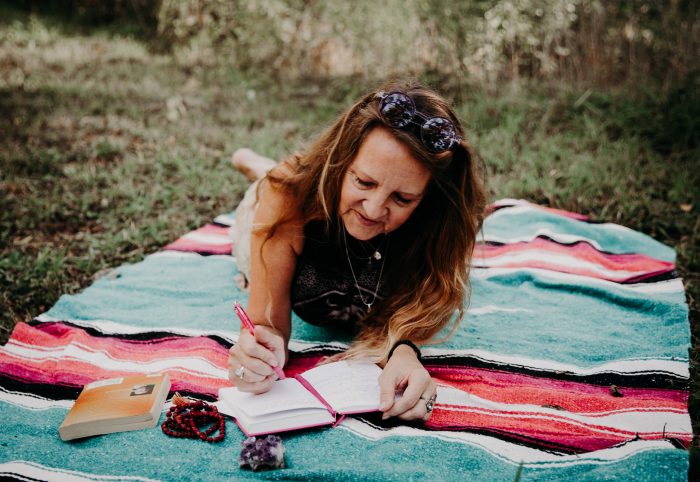About four years ago, I discovered Rachel Brathen’s podcast “Yoga Girl: Conversations From the Heart,” and I instantly became an avid listener.
One thing I love about her weekly show, and her daily podcast, fittingly named, “Yoga Girl Daily,” is that she honestly and openly shares her struggles with her listeners and provides all sorts of wonderful healing and self-growth practices.
I unabashedly admit I love them all.
One in particular that has become a ritual for me is her closing and intention-setting ceremony, which she features annually on Yoga Girl, just before the year’s end.
I truly can’t imagine entering into a new year without this practice. It’s always so revealing, unearthing many surprises and unexpected feelings and leaving me full of gratitude and hope for what’s to come. This year, Rachel felt that the closing and the intention-setting each needed their own practice. She believed that we all needed some serious time to process 2020 before moving on toward dreaming about what we wanted in the new year.
She was right. There was a lot to look at and work through.
The podcast aired on December 18, and the next morning, I woke up ready to partake of Rachel’s wisdom. I brewed some tea and set up my space—candles, incense, Palo Santo, crystals, and, most importantly, a journal and a pen. Then I excitedly opened up the podcast on my Spotify and clicked play.
What I thought was going to be an hour or so of writing ended up taking me several hours, which I stretched over a couple of days. The practice is essentially a long journaling exercise with lots of prompts, Rachel’s guidance and sharing, and a few meditations for grounding and balance.
She didn’t shy away from anything. She asked the hard questions, and the experience was as intense as it was amazing.
What an emotional ride.
I was not expecting what happened at all. It was hard, heart-opening, and beautiful. At first, the words flowed easily, but then I found myself getting agitated and even frustrated. I’d start writing and then wouldn’t want to go any further. A couple of times I was ready to quit. But I knew I could trust the process. I recognized that those reactions were just me not wanting to face a lot of junk from the past year and really resisting looking deeply at what was coming up as I wrote.
This all probably sounds rather unpleasant. You might be thinking, “Why would I put myself through that?” But I can assure you, in the end, I felt grateful and calm, as though a weight had been lifted, and I could move into 2021 a little more healed and conscious.
We all know that healing is never easy and that looking back at old stuff and processing it can really suck. It’s hard, hurtful, and uncomfortable, but it’s the only way through it. And journaling as a practice really helps us get all the things out of our hearts and heads where we can see them and give them the attention they need.
I am so glad that I pushed myself to keep going—to keep writing and get it all out.
A lot happened this year for us all. It was a year unlike any for most of us—full of fear, loss, beauty, love, and heartbreak. Obviously, one or two days of journaling isn’t going to magically heal us, but it can open some doors toward letting go, and I truly believe we can all have a better start to the new year if we hold some space to process and reflect.
If you’d like to go on this journey, please give the podcast a listen. Rachel guides us gently through it, so it’s not so terribly hard. To let you know what to expect before you start, I’ve loosely written out the prompts and steps for you below.
Now all that’s needed is a journal or notebook and a favorite pen—maybe a cup of tea. It’s also comforting to set up a space that feels sacred, safe. And then get ready to process.
The prompts.
1. What is your feeling of 2020? Right now I feel…
2. What does your timeline of the year look like? (Get the months and milestones down on paper.)
3. What was the most noteworthy experience?
4. What was your year at a glance? In 2020 I…(Just write on what you did, such as, I grew tomatoes, I cried, I wrote poetry, I quarantined, etc.)
5. What was your main intention in 2019?
6. What did 2020 teach you?
7. What did you learn about yourself?
8. What really hurt?
9. What did that pain show you about yourself?
10. What was beautiful, wonderful, delicious?
11. What were you grateful for? (Rachel suggests writing sentences that start with the words “Thank you,”—”Thank you, mom, for calling me every day.”)
12. What really hard lesson did you learn that you don’t want to learn again?
13. What are you leaving behind that you do not want to take into 2021?
14. What do you want to take with you into 2021?
Wow. So many big questions. So much to ponder and reflect upon. And so much opportunity for us to work through this year and let some things go, together. I’m so grateful for this practice and am really looking forward to doing the intention-setting for 2021—time to dream on what’s possible. That podcast aired on Christmas day, so there’s still plenty of time to do both practices before 2021 arrives. I believe it is what all of our hearts need.
~


 Share on bsky
Share on bsky





Read 23 comments and reply